|
|
|
Sort Order |
|
|
|
Items / Page
|
|
|
|
|
|
|
| Srl | Item |
| 1 |
ID:
105338
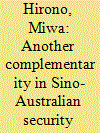

|
|
|
|
|
| Publication |
2011.
|
| Summary/Abstract |
This paper examines how China has played a "responsible" role in international humanitarian post-disaster assistance by taking the example of China's assistance to post-tsunami Aceh, and explores policy implications with regard to future Sino-Australian security cooperation. China and Australia took inconsistent approaches to assistance in Aceh, which derived from their different understandings of international "responsibility". However, the inconsistencies do not necessarily hamper cooperation between the two. Rather, it is because of these inconsistent approaches that the two countries' cooperation can develop into comprehensive and multifaceted assistance. The key to successful cooperation between the two countries, this paper argues, is the notion of "complementarity". In policy documents on bilateral relations, Chinese and Australian policymakers emphasize the "economic complementarity" between the two, but this "complementarity" is also useful when the two explore the way in which they will cooperate on security issues. One example of this complementary approach with regard to assistance for Aceh is the Australian effort to promote stability in both tsunami and non-tsunami affected areas, and Chinese economic investment in Aceh, in keeping with the Acehnese local expectations of long-term economic development and more employment opportunities, which are the foundation stones of stability. While these efforts are not consistent, they are highly complementary to each other, and have great potential to encourage peace and stability in Aceh.
|
|
|
|
|
|
|
|
|
|
|
|
|
|
|
|
| 2 |
ID:
167638
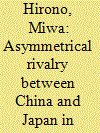

|
|
|
|
|
| Summary/Abstract |
To what extent is China–Japan rivalry a global phenomenon, and what is the nature of the rivalry they engage in outside their own region? Literature on Sino-Japanese rivalry abounds, but it pays scant attention to the relevance of the rivalry outside East Asia. This article argues that Sino-Japanese rivalry has indeed become a global phenomenon, that various forms of the rivalry are evident in Africa, and that they are mostly of an asymmetrical nature. Quantitatively, China’s contribution to Africa is far greater than that of Japan, with the exception of foreign direct investment (FDI). Qualitatively, though, Japan has a stronger sense of the rivalry than China has, revealing a psychological aspect to the asymmetry as well. Contextually, the types of activity that Chinese and Japanese actors carry out in Africa are not necessarily the same, which makes the rivalry all the more asymmetrical. The rivalry has become more apparent recently, not only because of the rise of China but also because of a change in the meaning of ‘Africa’ – from a region of ‘poverty’ and ‘hunger’ to a region of ‘economic opportunities’. That said, Africa – to a greater or lesser degree in each of its countries – still suffers from conflict and instability. As a result, the ability of Japan and China to exert power and influence throughout Africa is somewhat restricted.
|
|
|
|
|
|
|
|
|
|
|
|
|
|
|
|
| 3 |
ID:
108075
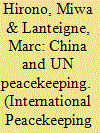

|
|
|
|
|
| Publication |
2011.
|
| Summary/Abstract |
After many decades of eschewing participation in UN peacekeeping missions, the People's Republic of China has since the 1990s rapidly reversed its critical stance and become an enthusiastic supporter of and contributor to several different types of UN missions including, some that have involved non-traditional peacekeeping. Evolving Chinese peacekeeping policy has suggested that despite the country's widely acknowledged rise to great-power status, within UN peacekeeping it still takes on the role of a middle power in its preferences for multilateralism and 'norm-taking'. Although China has stated that it wishes to continue its deep engagement in UN peacekeeping within its established norms for the near future, its presence as a rising power has prompted much new debate on how the country will tacitly and directly shape peacekeeping policy.
|
|
|
|
|
|
|
|
|
|
|
|
|
|
|
|
| 4 |
ID:
108083
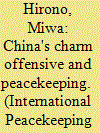

|
|
|
|
|
| Publication |
2011.
|
| Summary/Abstract |
China's participation in UN peacekeeping is often viewed as a part of a global 'charm offensive' aimed at enhancing China's image in host countries. However, when viewed in the light of its support for dictatorial regimes in those host countries, do Chinese peacekeeping efforts improve the perceptions local populations have of China? This article examines changes in Cambodian perceptions of China during the UN Transitional Authority in Cambodia (UNTAC) from 1992 to 1993. It argues that China's peacekeeping contribution to UNTAC helped to overcome negative perceptions of that country rooted in its support of the Khmer Rouge before 1992. The key to overcoming current negative perceptions is to project an image of Chinese neutrality with respect to all parties in a civil war. This article concludes by discussing the implication of this argument with regard to China's peacekeeping in Sudan from 2006 to the present, and suggesting that China will need to be more attentive to the needs of other warring factions in the north-south and Darfur conflicts.
|
|
|
|
|
|
|
|
|
|
|
|
|
|
|
|
| 5 |
ID:
168171
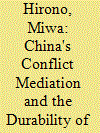

|
|
|
|
|
| Summary/Abstract |
China's efforts in conflict mediation are an important test of the durability of the principle of non-interference. By analysing the approaches and means of China's post-2014 mediation efforts in Afghanistan, this article finds that China's behaviour shows it engages in medium-level interference in domestic affairs, but mostly with the host government's concurrence. This is because of the two forms China's mediation takes. In a bilateral context, China's mediation takes the form of “incentivizing mediation,” in which its economic power, and its omnidirectional foreign policy, provide incentives or leverage for warring factions to come to the negotiation table, but which also lets the warring factions formulate their own roadmap to peace talks. In a multilateral context, China sometimes engages in “formulative mediation,” in which the mediators, not the disputing parties, formulate a roadmap to peace talks.
|
|
|
|
|
|
|
|
|
|
|
|
|
|
|
|
| 6 |
ID:
124742
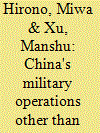

|
|
|
|
|
| Publication |
2013.
|
| Summary/Abstract |
Although political friction and ideological differences between China and the West can hamper co-operation on missions known as 'Military Operations Other than War', the UK and China have achieved a certain level of success in this regard, particularly in relation to UN peacekeeping and counter-piracy operations. In this article, Miwa Hirono and Manshu Xu argue that the key has been to use multilateral platforms to frame bilateral collaboration, thereby diminishing Chinese perceptions of the associated political risks. Thus it is useful for Western militaries to exploit multilateralism to make military co-operation more attractive to China.
|
|
|
|
|
|
|
|
|
|
|
|
|
|
|
|
| 7 |
ID:
168169
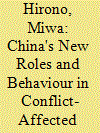

|
|
|
|
|
| Summary/Abstract |
China's view on the sanctity of state sovereignty has slowly but inexorably been transformed, and the country has found it difficult to continue to adhere to the principles of non-interference and non-intervention with the same degree of rigour as during the Cold War era. This special section will explore what the principles mean to China today; why and how Beijing has become active in peacebuilding and conflict mediation; and what implication China's approach to the principles has for its position in the global liberal order. This article sets the scene by firstly demonstrating that defining the principles has always been a political act, and secondly offering new discussions about how China's expanding economic power forced the country to more actively engage in politics of conflict-affected regions. Finally, it offers a conceptual framework to explain why and how China has become increasingly active in peacebuilding and conflict mediation.
|
|
|
|
|
|
|
|
|
|
|
|
|
|
|
|
| 8 |
ID:
176226
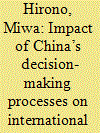

|
|
|
|
|
| Summary/Abstract |
International cooperation on peacekeeping operations, and on humanitarian assistance and disaster relief (HADR) operations, is important in tackling global non-traditional security threats. It also helps China address its ‘trust deficit’ problem. While both operations seem ‘low hanging fruit’ for international cooperation, the ways in which China undertakes peacekeeping and HADR cooperation differ – the former encompasses not only cooperation for technical and capacity development but also cooperation for policy harmonisation, while China’s HADR cooperation is limited to technical and capacity development. This paper asks, ‘why the difference?’, despite the fact that they both address similar policy problems. It argues that the difference corresponds to the level of holisticity/fragmentation of China’s decision-making process. The more holistic China’s decision-making process, the deeper the international cooperation. The nature of China’s decision-making processes has international policy implications, because the fragmented nature of those processes maintains cooperation at a functional level only, and hinders the deeper development of cooperation into policy harmonisation.
|
|
|
|
|
|
|
|
|
|
|
|
|
|
|
|
| 9 |
ID:
130417
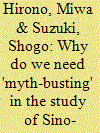

|
|
|
|
|
| Publication |
2014.
|
| Summary/Abstract |
The literature on Sino-African relations has debated whether or not China's growing presence is a threat to Western or African interests, and has come to the conclusion that China's behavior is not uniquely immoral. Many countries, including Western liberal democracies, similarly give aid to local autocrats to secure natural resources. Why, then, has so much effort been made to come to this perhaps unsurprising conclusion? We argue that the literature on Chinese foreign policy remains heavily influenced by Western states' policy interests, resulting in an impoverished debate that is primarily concerned with the idea of a China threat. In order to recover the diversity in our research on Chinese foreign policy, we argue for the need to go beyond the confines of Western strategic interests.
|
|
|
|
|
|
|
|
|
|
|
|
|
|
|
|
|
|
|
|
|